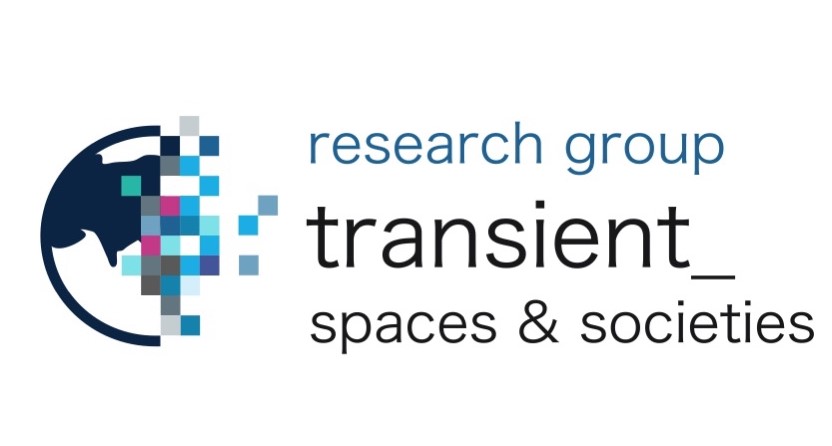Our Research at a Glance
The Transient Spaces & Societies Research Group is an interdisciplinary research team based at the Department of Geography at the University of Innsbruck. We are researching the entanglements and transitions of social, material, and digital spaces in the context of increasing digitisation, mobilities, and urbanisation. Our team takes a critical perspective on these cross-sectional processes and scrutinises how social practices and power relations shape them.

↑
What are Mobilities? Learn more in this video with John Urry, one of the leading authors on the mobilities paradigm.
A Quick Overview
Digitisation
Digitisation is a decisive driver of the transition of spaces and societies, whereby it is neither a new process nor has it taken the form of a single turn. Together with colleagues, we have argued for a more differentiated conceptualisation of change by acknowledging non-linear temporalities and multiple historicities in the entanglements of people, technologies and the environment. A particular focus has been the conceptualisation of space and (sense of) place in the digital age. Digital media’s possibilities as well as affordances contribute profoundly to the complexities and multifariousness of people’s perceptions of the world, i.e. to their mediated sense of place. With the concept of cON/FFlating spaces we seek thinking through people, technologies and materialities as unseparably entangled in time and space.
A further core interest of the research groups is in how people’s interactions through and with the Internet and mobile technologies affect their throwntogetherness in space, negotiations of difference, social relations and care or aversion towards others. We have, for example, discussed how fleeting online encounters contribute to the (re)production or refutation of prejudice and stereotypes of “others” in the context of diversity and difference. Our research has also analysed how digital media contributes to non-linearities as well as to entanglements of inclusion and exclusion. Our analysis of combined practices of traditional bullying and cyberbullying between young people in the context of schools shows how young people struggle more than ever to escape bullying, whereby bullying is often gendered with subjects identifying as female or non-binary being more often targets of bullying practices.
Since 2020 we added investigations into the role of digital technologies during the Covid-19 pandemic, e.g., in regards to how they (temporarily) altered young people’s everyday social and leisure activities and relations to the city, affected their experiences of learning and studying, their social networks and social resilience and graduating during the pandemic.
More recently we have co-edited the first Handbook on Digital Geographies (UTB) in German language and a reader of Digital Geographies (Steiner). Also see the DigitAS, beYOND, COV-IDENTITIES and Digital Media and Migration project pages for our research in this field.
Mobilities
Our research group analyses spatial and digital human mobilities, as well as their entanglements. Core foci are the effects of spatial mobilities – in particular the translocal and transnational practices and relations of migrant subjects – on the (re)shaping of urban transient spaces, translocal spaces and on migrants’ social resilience. Furthermore, we are looking at how the proliferation of digital media and digital migration are influencing migrants’ inclusion and exclusion as well as migration decisions, migrants’ imaginaries, and migrants’ senses of the places they pass through or move to. We debate the effects of migration management and policies on migrant mobilities, which in the last decade, throughout our research sites in Asia (e.g., the Migration Law and Regulations in China under Xi-Li, and the Singaporeans First Strategy in Singapore) and Central Europe, have become more fierce and hostile towards new arrivals.
Our team members have worked with diverse groups of mobile subjects from variegated origins and in various places of destination or transience, among them refugees in Europe, irregular migrants in China, rural-to-urban migrants in China, migrant workers in Singapore, Thai marriage migrants in Germany, return migrants in Thailand and privileged and middling highly-skilled migrants in Singapore. Through comparative work, we have sought to shift our attention from migrants’ varying origins, lengths of stay or distances travelled, to focus on the context of their common experience of the politics of mobilities and of socio-technological orderings on their socio-spatial inclusion and exclusion as well as their own forms of organisation, agencies, and strategies they use to adapt to, create, and cope with life in the receiving societies.
Refer to the pages of the projects beYOND, COV-IDENTITIES, New Media, Migration and the City, PRD 3 – Phase 1 and PRD 3 – Phase 2 for current and past work in this field.
Methods
Informed by an ethically reflected approach towards our subjects of research, the members of our research group apply and combine research method(ologie)s that range from more traditional qualitative and mixed methods to more-than-representational, mobile, and digital methods. In face of the increasing complexity in transient spaces and societies, we contribute to methodological development, particularly with regard to mobile smartphone methods, mobile methods, mobile in-situ data collection and mobile-eye-tracking in field-settings. We advocate for a context- and process-oriented doing of ethics in multi- and mixed methods research and particularly method development.
Regional Focus
The team’s research projects and activities comprise the following regions: Central Europe (Austria, Germany, Spain) and Southeast and East Asia (Singapore, Malaysia, China, Bangladesh).
Transdisciplinary outreach, third mission, Scicomm
We engage in the co-production and transfer of knowledge in transdisciplinary research projects, with stakeholders including civil society. For us, science communication through innovative formats and digital media is both part of our lived research and teaching practice and an object of research itself. Check out our Transient Spaces Blog.
%
... of the world's population lives in cities
© 2024
Research Group Transient Spaces & Societies
Geographisches Institut Innsbruck
Innrain 52, 6020 Innsbruck
Relevant links:


